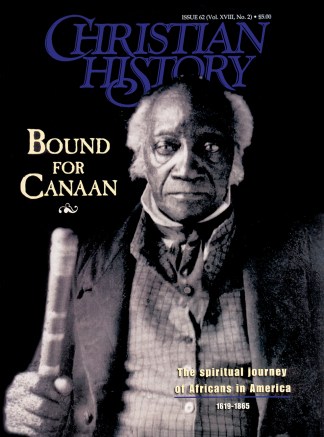The enslavement of an estimated ten million Africans over a period of almost four centuries in the Atlantic slave trade was a tragedy of such scope that it is difficult to imagine, much less comprehend.”
So begins Albert Raboteau in Slave Religion: The “Invisible Institution” in the Antebellum South (Oxford, 1978), the benchmark work on slave Christianity. But he and other scholars have done much to help readers comprehend and imagine life for African Americans before the Civil War—without downplaying the overwhelming tragedy of the situation.
Uniquely religious
As W. E. B. Du Bois and Booker T. Washington both noted, the story of the black church and black America are unalterably linked. It would be impossible to write about the black experience without reference to Christian faith. But until Raboteau’s book, there were few noteworthy tomes specifically on black religion. There are more now, but scholars still lament the breadth of such works.
Some of the better books are collections of primary source material, most notably Afro-American Religious History: A Documentary Witness (Duke, 1985), edited by Milton C. Sernett. He argues that such a work “does not constitute a history of Afro-American religion,” but merely serves to enable readers “to think about Afro-American religious history.” It certainly does that.
A more specific collection is Conversations with God: Two Centuries of Prayers by African Americans (HarperCollins, 1994). The prayers here are less historically important, but they do serve to show the vitality of black spirituality firsthand.
The main evangelical publishers have issued disappointingly few books on black Christianity, historical or otherwise. But based on recent releases, they might be starting to come around. InterVarsity Press recently issued a few introductory works to the black experience, including No Easy Walk (1998) by Harry Louis Williams II. Baker has a similar introduction: Breaking Down Barriers (1998) by Dwight Perry.
The bigger picture
Two of the most exciting and comprehensive resources about early African-American experience are not books. One is the Microsoft’s Encarta Africana (1999), a multimedia CD-ROM co-edited by Harvard’s Henry Louis Gates, Jr., and Kwame Anthony Appiah. With more than 3,000 articles, it’s being hailed as the culmination of Du Bois’s dream of such a compendium of knowledge.
The other is Africans in America, a PBS documentary series with an incredibly comprehensive supplementary website and book (Harcourt Brace, 1998). Great emphasis is placed on Christianity’s role in black life, and the website (http://www.pbs.org/wgbh/aia/) includes hundreds of primary source documents, photos, and interviews with scholars to extend its narrative.
Among the nonelectronic media, however, Vincent Harding’s There Is a River: The Black Struggle for Freedom in America (Harvest/ HBJ, 1981) is grand and thorough—and perhaps the most dynamic narrative on the subject. Bullwhip Days: The Slaves Remember (Weidenfeld & Nicolson, 1988) and Remembering Slavery (New Press, 1998) are primary source collections that will both educate and haunt their readers.
Copyright © 1999 by the author or Christianity Today/Christian History Magazine.Click here for reprint information on Christian History.










